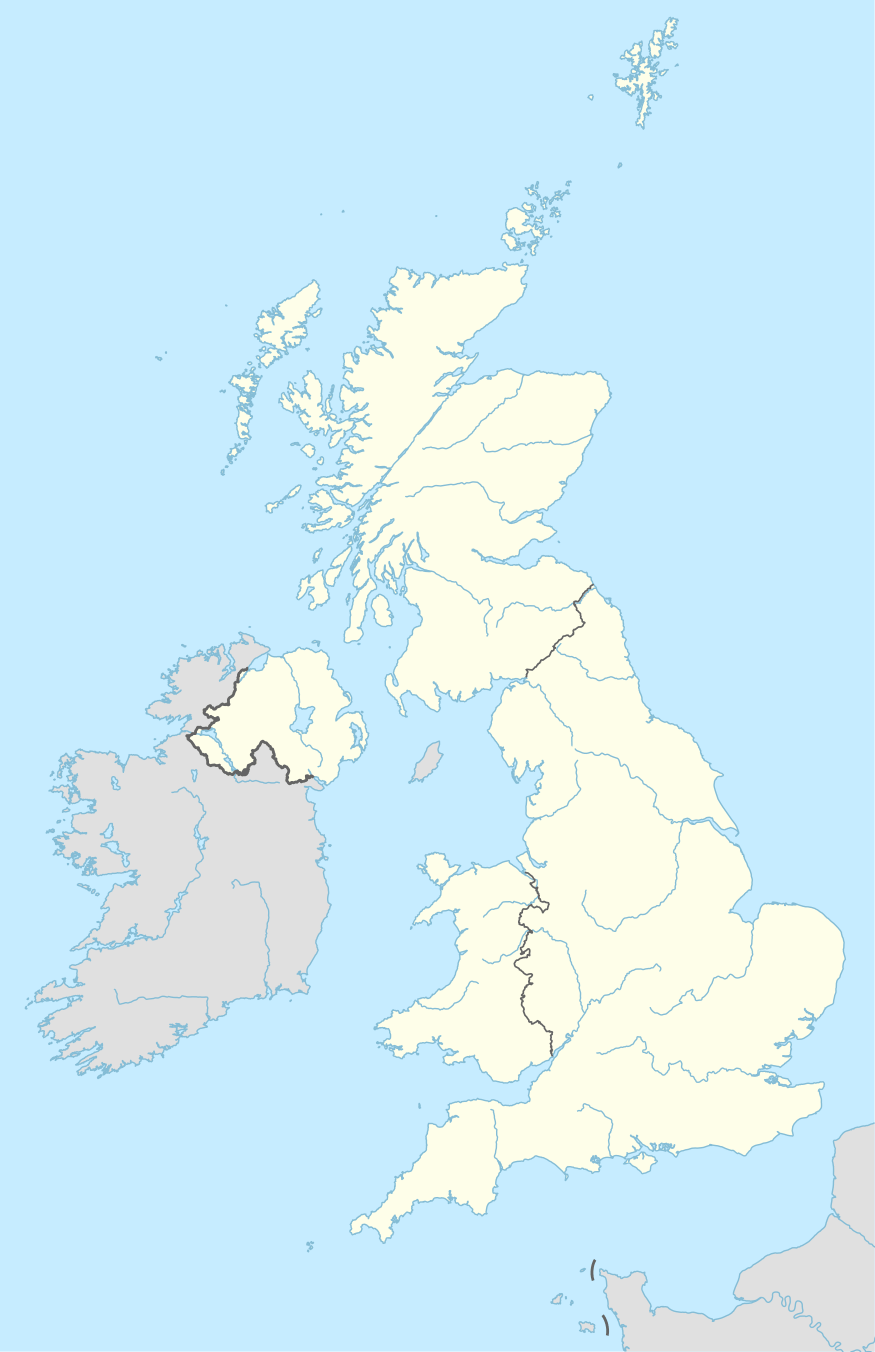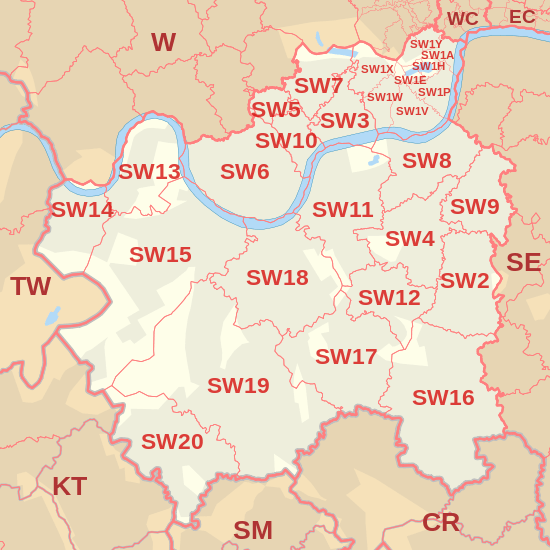SW postcode area
The SW (South Western) postcode area, also known as the London SW postcode area,[2] is a group of 29 postcode districts of a broad radial swathe of southwest London, England covering around 19.890 live postcodes as far as Mortlake, Streatham and Raynes Park. The area straightforwardly succeeds a shorter-lived South Western (SW1–SW10) and Battersea (SW11–SW20) split between its components[3] of the London post town.
| London SW postcode area | |
|---|---|
 SW | |
| Postcode area | SW |
| Postcode area name | London SW |
| Post towns | 1 |
| Postcode districts | 29 |
| Postcode sectors | 139 |
| Postcodes (live) | 19,890 |
| Postcodes (total) | 36,392 |
| Statistics as at May 2020[1] | |
Postal administration
The postcode area originated in 1857 as the SW district. In 1868 it gained some of the area of the very short-lived S district, with the rest going to SE. It was divided into numbered districts in 1917.[4] The South Western district[3] consists of the postcode districts SW1–SW10[3] and the once Battersea-headquartered component[3] consists of the postcode districts SW11–SW20.[5]
The South Western head district was designated as SW1 and the rest of the numbering followed, alphabetically, by their most important parish, chapelry, topological or built environment feature names, up to 10. Similarly as to the Battersea SW11 once "head district".
List of postcode districts
The approximate coverage of the postcode districts, with the historic postal district names shown in italics:[5]
| Postcode district | Post town | Coverage | Local authority area(s) |
|---|---|---|---|
| SW1A | LONDON | Whitehall, Buckingham Palace, the Houses of Parliament and west of St James's | Westminster |
| SW1E | LONDON | Northern 'Victoria' around Buckingham Gate (a street) to include both sides of part of Victoria Street | Westminster |
| SW1H | LONDON | Surrounds of St James's Park tube station centred on Broadway, Queen Anne's Gate and Old Queen Street to include both sides of part of Victoria Street – derivation: Horse Guards Parade | Westminster |
| SW1P | LONDON | A projection around Parliament Square. Nearby Westminster School to Westminster Cathedral to CCAL, University of the Arts, London (omitting all backstreets nearest to Vauxhall Bridge Road) – derivation: Parliament Square | Westminster |
| SW1V | LONDON | between Vauxhall Bridge, Grosvenor (or Victoria Railway) Bridge and Victoria Station, taking in both sides of Vauxhall Bridge Road; includes Pimlico | Westminster |
| SW1W | LONDON | South or lower Belgravia and Chelsea (a corner), from Sloane Square to Victoria Station to Grosvenor Waterside basin | Westminster, Kensington and Chelsea |
| SW1X | LONDON | Rest of Belgravia (north of Eaton Square), Knightsbridge (eastern half) and Chelsea (a corner) | Westminster, Kensington and Chelsea |
| SW1Y | LONDON | All but the west of St James's | Westminster |
| SW2 | LONDON | Brixton district: Brixton Hill, Tulse Hill (part), Brixton (part), Streatham Hill, Clapham (part), Eastern parts of Balham, Lambeth | Lambeth |
| SW3 | LONDON | Chelsea district: Chelsea, Brompton, Knightsbridge (part) | Kensington and Chelsea |
| SW4 | LONDON | Clapham district: Clapham, Stockwell (part) | Lambeth, Wandsworth |
| SW5 | LONDON | Earls Court district: Earls Court | Kensington and Chelsea |
| SW6 | LONDON | Fulham district: Fulham, Parsons Green | Hammersmith and Fulham |
| SW7 | LONDON | South Kensington district: South Kensington, Knightsbridge (part) | Kensington and Chelsea, Westminster |
| SW8 | LONDON | South Lambeth district: South Lambeth, Wandsworth Road, Vauxhall, Battersea:Nine Elms (part), Clapham (part), NW area of Stockwell, Oval (part) | Lambeth, Wandsworth |
| SW9 | LONDON | Stockwell district: Brixton, Stockwell, Clapham (part), Oval (part) | Lambeth |
| SW10 | LONDON | West Brompton district: West Brompton, Chelsea (part) | Kensington and Chelsea, Hammersmith and Fulham |
| SW11 | LONDON | Battersea head district: Battersea, Clapham South | Wandsworth, Lambeth |
| SW12 | LONDON | Balham district: Balham, Clapham South, Wandsworth Common (part) | Wandsworth, Lambeth |
| SW13 | LONDON | Barnes district: Barnes | Richmond upon Thames |
| SW14 | LONDON | Mortlake district: Mortlake, East Sheen | Richmond upon Thames |
| SW15 | LONDON | Putney district: Putney, Roehampton, Kingston Vale, Putney Heath, Putney Vale, Richmond Park, Roehampton Vale | Wandsworth, Kingston upon Thames, Richmond upon Thames |
| SW16 | LONDON | Streatham district: Streatham, Streatham Common, Norbury, Streatham Park, Furzedown, Streatham Vale, Mitcham Common, Pollards Hill, Eastfields | Lambeth, Croydon, Wandsworth, Merton |
| SW17 | LONDON | Tooting district: Tooting, Balham (part), Mitcham (part) | Wandsworth, Merton |
| SW18 | LONDON | Wandsworth district: Wandsworth Town, Southfields, Earlsfield | Wandsworth |
| SW19 | LONDON | Wimbledon district: Wimbledon, Colliers Wood, Merton Park, Merton Abbey, Southfields, Morden (part) | Merton, Wandsworth |
| SW20 | LONDON | West Wimbledon district: Raynes Park, Lower Morden, Merton Park, Wimbledon Chase | Merton |
SW1
SW1 is the South Western head district. Since about the 1890s it has had a surplus of addresses and buildings for practical division into one set of inwards codes so is divided into smaller postcode districts since 1917 used for mail purposes. SW1 is used in geographic reference, street signs and colloquial use across most communities. Its eight subdivisions continue to be classed as one 'district'. Within SW1A are keynote inward codes including:
- SW1A 0AA – House of Commons
- SW1A 0PW – House of Lords, Palace of Westminster
- SW1A 1AA – Buckingham Palace
- SW1A 2AA – 10 Downing Street, Prime Minister and First Lord of the Treasury
- SW1A 1BA – Clarence House, Residence and Office of Prince of Wales and Duchess of Cornwall
- SW1A 2AB – 11 Downing Street, Chancellor of the Exchequer
- SW1A 2AH – Foreign and Commonwealth Office, King Charles Street
- SW1A 2HQ – HM Treasury headquarters
Boundaries
The SW postcode area covers parts of nine London Boroughs. North of the River Thames, it covers the southern parts of the City of Westminster, the Royal Borough of Kensington and Chelsea and the London Borough of Hammersmith and Fulham. South of the river, it covers all of the London Borough of Wandsworth, the western part of the London Borough of Lambeth, the northern parts of the London Boroughs of Merton and Croydon, the northeastern part of the London Borough of Richmond upon Thames, and a very small part of Royal Borough of Kingston upon Thames.[6][7]
Map
References
- "ONS Postcode Directory Version Notes" (ZIP). National Statistics Postcode Products. Office for National Statistics. May 2020. Table 2. Retrieved 19 June 2020. Coordinates from mean of unit postcode points, "Code-Point Open". OS OpenData. Ordnance Survey. February 2012. Retrieved 21 April 2012.
- Royal Mail (2004). Address Management Guide (4 ed.). Royal Mail Group.
- Monopolies and Mergers Commission (1980). The Inner London Letter Post. HMSO. Archived from the original on 19 January 2012.
- "Postcodes" (PDF). Archive Information Sheet. The British Postal Museum and Archive. Archived from the original (PDF) on 20 March 2009. Retrieved 24 March 2010.
- "Names of Streets and Places in the London Postal area". HMSO. 1930.
- File:Londonpostal iln 1857.jpg
- Postcodes in the United Kingdom#History
External links
- "SW1". The Postcodes Project. Museum of London. Archived from the original on 28 December 2012.
- "SW2". The Postcodes Project. Museum of London. Archived from the original on 27 December 2012.
- "SW3". The Postcodes Project. Museum of London. Archived from the original on 9 November 2012.
- "SW4". The Postcodes Project. Museum of London. Archived from the original on 24 September 2012.
- "SW5". The Postcodes Project. Museum of London. Archived from the original on 24 September 2012.
- "SW6". The Postcodes Project. Museum of London. Archived from the original on 24 September 2012.
- "SW7". The Postcodes Project. Museum of London. Archived from the original on 24 September 2012.
- "SW8". The Postcodes Project. Museum of London. Archived from the original on 20 September 2007.
- "SW9". The Postcodes Project. Museum of London. Archived from the original on 27 November 2012.
- "SW10". The Postcodes Project. Museum of London. Archived from the original on 9 November 2012.
- "SW11". The Postcodes Project. Museum of London. Archived from the original on 28 December 2012.
- "SW12". The Postcodes Project. Museum of London. Archived from the original on 24 September 2012.
- "SW13". The Postcodes Project. Museum of London. Archived from the original on 24 September 2012.
- "SW14". The Postcodes Project. Museum of London. Archived from the original on 20 August 2010.
- "SW15". The Postcodes Project. Museum of London. Archived from the original on 27 November 2012.
- "SW16". The Postcodes Project. Museum of London. Archived from the original on 25 September 2012.
- "SW17". The Postcodes Project. Museum of London. Archived from the original on 20 April 2012.
- "SW18". The Postcodes Project. Museum of London. Archived from the original on 25 September 2012.
- "SW19". The Postcodes Project. Museum of London. Archived from the original on 25 September 2012.
- "SW20". The Postcodes Project. Museum of London. Archived from the original on 25 September 2012.
